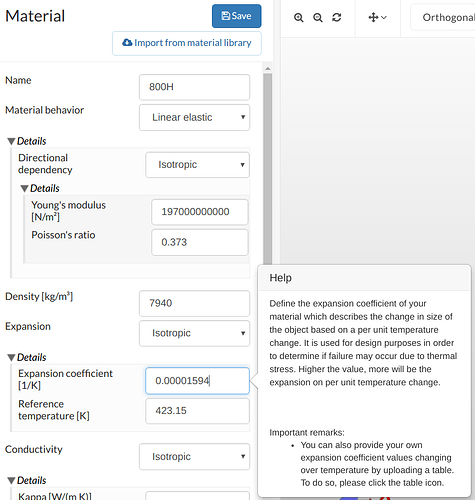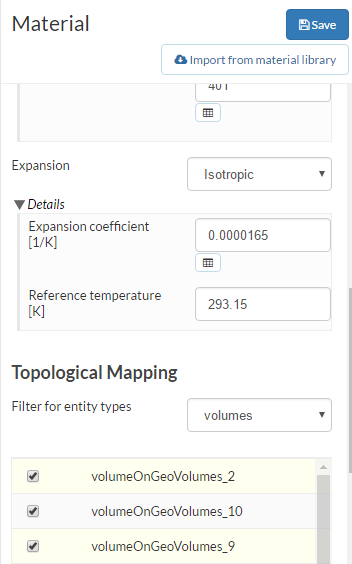Hello,
For thermomechanical analysis (advanced, transient, static, nonlinear), what’s the difference between the reference temperature in a material’s parameters and the initial condition of temperature? It seems that these both set the initial temperature of the material and therefore determine the thermal stress from temperature changes.
Thanks,
Cedric
Hi Cedric (@ceveleigh) ,
Thanks for your question and welcome to SimScale 
Based on my understanding, the initial condition sets the initial temperature of the material whereas the reference temperature is related to thermal expansion, and is the temperature after which the thermal expansion will start.
@ahmedhussain18, feel free to add on here if I am missing anything.
Hope that helps,
Best,
Anna
Hello @ceveleigh,
the reference temperature defines the point of zero thermal strains and it is only used in the mechanical part of the thermo-mechanical analysis.
The initial condition temperature has the same meaning as for any thermal analysis by defining the initial state of the model at the start of the computation and is used only for the thermal part of the chained thermo-mechanical computation.
So, changing the reference temperature has zero effect on the thermal part, whereas changing the initial condition completely changes the solved problem. Usually a reference temperature different from the initial temperature is used to define a pre-stress, see for example this project of a thermal shock analysis of a globe valve where this technique is used for defining bolt pre-stress.
Best,
Richard
2 Likes
@rszoeke, @AnnaFless, thanks for your answers.
The difference between the two still isn’t entirely clear to me. Maybe I’ll understand with an example: given a tube with two concentric bonded layers of material (each material is different with a different coefficient of thermal expansion), the outer layer starts at 1100C and the inner layer at 100C, both their temperatures are changed to 600C, and I would like to find the thermal stress in the outer layer of material, how should I define the reference temperature (for each material) and the initial condition temperature?
-Cedric
Hi @ceveleigh I’ll try and explain in other words, using your example:
In the case you describe, the 1100°C and 100°C correspond to the Initial Conditions for Temperature.
On the other hand, the reference temperature is the value at which the thermal deformation (and hence the stress) of a material is zero. If the material temperature deviates from this value, compression or extension will occur and stress will be developed.
To answer your question, to define the reference temperature for a material, you look at the thermal expansion model, it should give you two parameters: the expansion coefficient and the reference temperature (at which the expansion is zero). So you should have those two parameters for both of your materials. If a reference temperature is not given, it is often assumed to be ambient temperature (25°C).
2 Likes
This information about instantaneous versus averge thermal expansion coefficients helped clarify my confusion about the reference temperature: Beste forbrukslån på dagen | Forbrukslånsiden.com
An additional, related issue is that there seems to be a bug in the user interface. In this screenshot, you can see in the suggestion box that I should be able to add several coefficients of thermal expansion in function of temperature by clicking on a “table icon”, but I don’t see this icon. Am I missing something?
Hi @ceveleigh,
could you share the project you encountered the issue with? Normally there should be a small table symbol under the field. I will have a look at that.
Cheers,
Jousef
Hi Jousef, here’s a link to the project:
Thanks,
Cedric
Thanks for the link @ceveleigh!
I will have a look at that later on. Maybe I missed something here. Will get back to you as soon as possible.
Cheers!
Jousef
Hi Cedric,
back with some information. I saw that you chose a steady-state / static analysis.
If you switch to a transient / dynamic analysis you are able to see the table upload icon. Let me know if that helps.
Cheers!
Jousef


